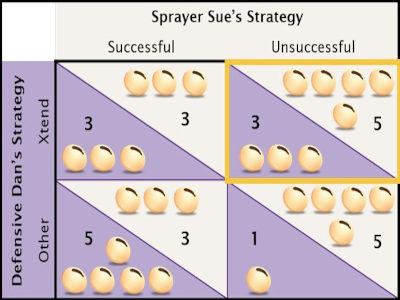By Sarah Lancaster and Terry Griffin
Understanding farmers’ decision making processes can be helpful for Extension personnel who might find themselves in a situation where one farmer’s weed management decision negatively impacts others. This has become increasing prevalent as herbicide-resistant weeds and crops have become more prevalent. After discussing this scenario with some agricultural economists, we decided to apply game theory to farmers’ decisions related to dicamba-resistant soybeans to see the theory would be a useful tool.
What is game theory?
Game theory is an economic tool that can be used to understand decision making in circumstances where uncertainty exists, such as when neighboring farmers make management decisions without knowledge of the other’s actions. Game theory takes possible outcomes for a given scenario and assigns a payoff to each outcome for each ‘player’. The greater the assigned value, the more beneficial the strategy is for each player. The intent of these “games” are to identify stable outcomes called Nash equilibria, which occurs when no player can improve their payoff, assuming the everything else remains the same.
In a more detailed article posted to AgManager.info, we evaluated two farmers. One farmer, Dan, is deciding whether to plant dicamba-resistant soybeans or other soybeans. The other farmer, Sue, has the possibility of dicamba applied to her soybeans successfully staying on target or unsuccessfully moving off target. Next, we considered how regulatory fines and other external factors would change the stable outcome for the scenario. One of the interesting findings is that sometimes, the decision that would be most beneficial for a farmer is not the decision that results in a stable scenario.
An example of a scenario with payoffs is presented in Figure 1. The payoff score assigned to each player in the figure is represented by the number of soybeans. The different outcomes in this scenario are described below.
- Dan should use Other soybean if he believes Sue will be Successful (payoff = 5), but if Sue is unsuccessful, he should use Xtend (payoff = 3);
- Sue is better off when her application is successful (payoff = 5), regardless of Dan’s decision;
- The combined payoff is similar for Other\Successful and Xtend\Unsuccessful (combined payoff = 8);
- Xtend\Unsuccessful is the most stable or likely outcome for Scenario 1, because neither farmer can improve their payoff with a different choice assuming the other farmer does not change their strategy. Assuming Sue remains Unsuccessful, if Dan chooses Other instead of Xtend, his payoff decreases from 3 to 1. Assuming Dan remains Xtend, if Sue changes to Successful, her payoff decreases from 5 to 3.

Figure 1. Example payoff for two farmers, Dan and Sue, making weed management decisions.
Our intent with this article is not to comment on the value of the herbicide-resistant technologies or the consequences of OTM. Or goal is to recognize that each farmer makes the most rational farm management decision based on beliefs about their own operation and expectations of other farmers’ choices. The scenarios presented in this document are intended for educational purposes only and do not imply recommendation of any management practices. Use of specific products is for illustrative purposes only and are not intended as endorsement or disapproval of any product or technology.
Source : ksu.edu